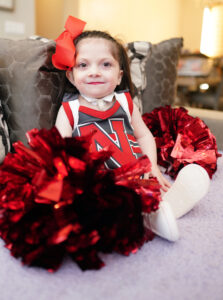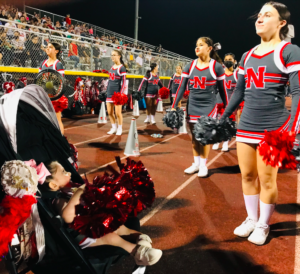MISSION — Leslie Sarinana is, in many ways, a giant.

She has a giant’s personality. She seems, often, to have never met a stranger, and she doesn’t mind showing off for a crowd.
It would surely take a giant to pass the hurdles she’s leaped and overcome the obstacles she’s strode over.
It would surely take a heart of something gigantic to absorb all the affection Leslie gets; so much of it that you don’t know how it fits in one little body.
Maybe she reflects it — the people around Leslie always seem to have a smile on their face.
Little Leslie Sarinana, 11, stands just shy of 27 inches tall.
She looked quite a lot taller last month, during a packed game between BL Gray Junior High and Sharyland North Junior High, when she was recognized on the field.
Leslie was named an honorary Sharyland North Junior High cheerleader, given a mum on account of it being homecoming and joined the rest of the squad for its routines, all the while wearing a uniform commissioned by a mother on the cheerleading team.

Leslie, sitting in the stroller she uses to get around, shook her pom poms with the rest of the squad, beaming a big smile up at the stands. She seemed to know most of the routines as well as most of the other girls.
A decade ago, none of that was in the cards for Leslie. A decade ago, it looked like she would very well die.
Nikki Sarinana, Leslie’s mother, says doctors noticed Leslie wasn’t developing normally when she was pregnant. She wasn’t growing, to put it simply. Her lungs were underdeveloped, and she was born with a cleft palate. She was later diagnosed with Spondyloepiphyseal dysplasia congenita, a type of dwarfism that is extremely rare.
Nikki had a hard time understanding it all at first. She researched the disease as well as she could.
There wasn’t much to find; today, the Wikipedia entry for Leslie’s condition is less than 1,000 words long.
Leslie spent her first year on a ventilator. She flatlined several times. At one point Leslie’s sugar levels dropped dramatically; she came close to dying again.
Nikki and her husband turned to their faith. They prayed.
Nikki spent that year, and many since, with that terribly unwieldy name.
“Spondyloepiphyseal dysplasia congenita,” Nikki would repeat it to herself, practicing. “Spondyloepiphyseal dysplasia congenita.”
At a doctor’s appointment down the road, Nikki blanked and couldn’t remember how to put all those syllables together. She was afraid the doctor would think she hadn’t been paying attention to Leslie’s treatment.
Nikki and her husband were paying attention to Leslie’s treatment though, and it showed. Leslie had gotten off her ventilator after her first year, though she still needs a tracheostomy because of an obstructed airway caused by her cleft palate.
Therapy, of various sorts, followed the ventilator.
When Leslie was about six, her parents practiced with Leslie on her speech. It was hard, but it worked: Leslie can cover her trache and talk now, or do the same with a Passy Muir valve.
Nikki describes those lessons as a “learning experience,” casting a positive light on things.
It was often not positive though, and you can hear that in Nikki’s voice. It was a struggle for Leslie and it was a struggle for Leslie’s parents.
“You know, she’s so strong,” Nikki said Friday, audibly sobbing at the trials her daughter has gone through. “She’s a little fighter. She’s been through a lot. We just do our best as parents to make sure she’s taken care of the best that we can.”
The best, for Leslie, is a football game.
She’s been entranced by them for years: mesmerized with one of her cousins leading cheers, fascinated by her brother running the ball as quarterback.
“She was just taken by all of the excitement of it,” Nikki said. “So she would be in her stroller cheering, and we bought her some pom-poms, so she could feel like she was part of the cheer squad.”
Leslie has a habit of sitting on the couch and teaching her father cheers.
“I always tell the boys: you’re going to be hard pressed to find someone who doesn’t love Leslie,” Nikki says.
That love was on full display last month when Leslie was strolled down to the field to join the rest of the squad.
Ruby Barcenas, the squad’s cheer coach, says Leslie is an inspiration for the girls on her team.
“She sends a positive message, showing that she is motivated, dedicated,” she said. “She shows perseverance, facing adversity through her life.”
Nikki says that experience was particularly moving for Leslie, who’s planning on wearing her uniform again next year.
Nikki said it was also moving for a family that’s faced its share of hardships.
“We’ve felt a part of something. We’re new to Sharyland,” Nikki said, “but the people there have just been very wonderful. They’ve taken us in, like we’ve been there since the beginning.”



